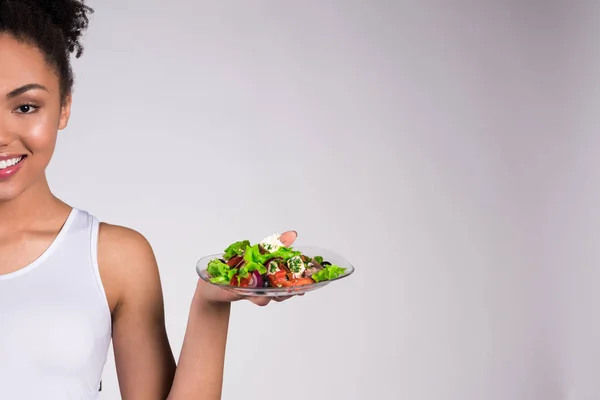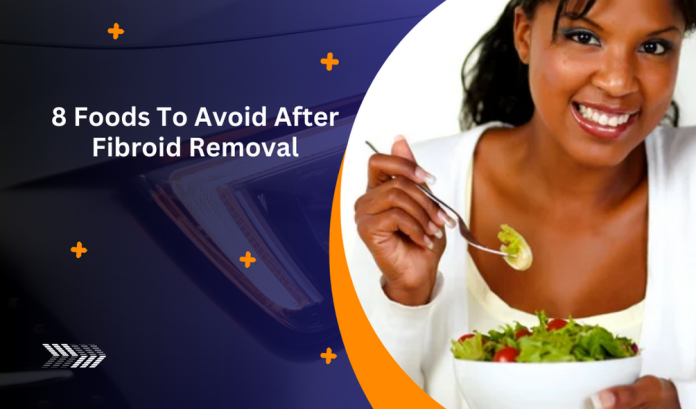These 8 Foods To Avoid After Fibroid Removal – Imagine a time when your periods become unpredictable, heavy, and even painful. This can be the reality for many women experiencing uterine fibroids, noncancerous tumors that grow in the uterus. While fibroids don’t pose a threat to overall health, their symptoms can significantly impact your quality of life. If you’ve recently undergone surgery to remove fibroids, you’re likely eager to get back to feeling your best.
One crucial aspect of recovery you might not expect plays a significant role in healing: your diet. Just like after any surgery, your body needs the right fuel to rebuild tissues and promote optimal healing. In this article, I’ll guide you through the best foods to support your body after fibroid removal surgery, along with some foods to avoid that can hinder the healing process.

Understanding the Power of Post-Surgical Diet
Think of your body after surgery like a construction zone. There’s meticulous work happening beneath the surface to mend tissues and restore strength. The food you choose becomes the building blocks for this internal repair. Studies have shown that a targeted post-surgical diet can significantly impact healing rates and reduce the risk of complications [1]. For instance, a study published in the Journal of Parenteral and Enteral Nutrition found that patients who received a diet rich in protein and specific micronutrients experienced faster wound healing and reduced infection rates [2].
By incorporating the right nutrients into your diet, you can actively support your body’s natural healing mechanisms and promote a smooth recovery after fibroid removal surgery.
8 Foods To Avoid After Fibroid Removal
Now, let’s delve into specific foods that might not be the best choices during your initial healing phase. Remember, the goal is to minimize inflammation and promote tissue repair.
- Red Meat and Processed Meats
Red meat (beef, lamb, pork) and processed meats (hot dogs, sausages, bacon) are often high in saturated fat and inflammatory compounds. A 2023 study published in the American Journal of Clinical Nutrition found a positive correlation between red meat consumption and increased levels of inflammatory markers in the body [3]. Since inflammation can hinder the healing process, it’s wise to limit these foods during your recovery. Opt for lean protein sources like grilled chicken, fish, or beans instead.
- Refined Carbohydrates
Refined carbohydrates, found in white bread, pastries, sugary cereals, and white rice, can cause blood sugar spikes. These spikes can lead to inflammation and potentially delay wound healing [4]. A 2022 study in the journal “Nutrients” suggests a link between high glycemic index foods (those that cause rapid blood sugar rise) and impaired wound healing in diabetic patients [5]. Focus on complex carbohydrates like whole grains, fruits, and vegetables for sustained energy and to support a healthy inflammatory response.
- Sugary Drinks and Foods
Added sugars found in sugary drinks, candies, and desserts contribute to inflammation throughout the body. A 2021 review published in Nature Reviews Immunology highlights the connection between excessive sugar intake and increased inflammatory markers [6]. While an occasional treat might be okay, it’s best to limit sugary indulgences during your recovery to promote optimal healing.
- Alcohol
Alcohol consumption can have a dehydrating effect on the body, which can further slow down wound healing. Studies, like a 2020 research paper published in “Wounds,” suggest that alcohol can impair collagen synthesis, a crucial component for tissue repair [7]. It’s best to minimize or avoid alcohol consumption altogether during the initial healing phase after surgery.
- Hydrogenated Fats
Hydrogenated fats, commonly found in fried foods, processed snacks, and commercially baked goods, are a type of unhealthy fat that can contribute to inflammation. A 2018 study in the journal “Prostaglandins, Leukotrienes, and Essential Fatty Acids” linked the consumption of hydrogenated fats with increased inflammatory markers [8]. Choose healthier fats like olive oil, avocado, nuts, and seeds to support your body’s healing process.
- Caffeinated Beverages
While a moderate amount of caffeine might be okay, excessive caffeine intake (more than 400mg per day) can potentially interfere with wound healing. A 2019 study published in “Burns” suggests that high caffeine doses may delay wound closure [9]. Be mindful of your caffeine intake from coffee, tea, and some energy drinks during your recovery.
- Spicy Foods
While spicy foods can add flavor to your meals, they might irritate your digestive system, especially after abdominal surgery. This irritation can lead to discomfort and potentially slow down your recovery. However, it’s important to note that tolerance for spicy foods varies greatly from person to person. If you typically enjoy spicy foods and haven’t experienced any post-surgical digestive issues, listen to your body and adjust accordingly.
- Foods High in Phytohormones (Soy Products)
Soy products, like tofu, tempeh, and edamame, contain naturally occurring plant compounds called phytoestrogens. These phytoestrogens can mimic estrogen in the body. While some limited research suggests a possible link between soy consumption and fibroid growth, the evidence is inconclusive [10]. It’s important to remember that fibroid development is a complex process with multiple contributing factors. If you have any concerns about soy intake, discuss them with your doctor. They can help you determine if soy products are a good fit for your individual situation.
What Are Some Foods To Eat After Fibroid Removal Surgery?
Now that we’ve covered the foods to avoid, let’s explore some dietary superstars that can actively promote healing after fibroid removal surgery.
- Fruits and Vegetables: These vibrant powerhouses are brimming with essential vitamins, minerals, and antioxidants. Antioxidants help combat inflammation and support tissue repair [11]. Aim for a rainbow of colors on your plate to ensure you’re getting a variety of beneficial nutrients.
- Lean Protein Sources: Protein is the building block for tissues throughout your body. During recovery, your body needs adequate protein to rebuild and strengthen tissues at the surgical site. Lean protein sources like chicken, fish, beans, lentils, and tofu are excellent choices.
- Whole Grains: Whole grains, such as brown rice, quinoa, whole-wheat bread, and oats, provide sustained energy and essential fiber. Fiber helps regulate your digestive system and promotes feelings of fullness, which can be helpful as you recover from surgery.
- Healthy Fats: Healthy fats, found in olive oil, avocado, nuts, and seeds, play a crucial role in wound healing and reducing inflammation [12]. They also contribute to a feeling of satiety and support overall well-being.
Hydration is Key
Remember, staying hydrated is essential for optimal health and recovery after surgery. Water helps transport nutrients throughout your body, flushes out toxins, and keeps your digestive system functioning smoothly. Aim to drink plenty of water throughout the day, and consider incorporating herbal teas or low-sugar fruit-infused water for added flavor variety.
Conclusion: Fueling Your Healing Journey
By making informed dietary choices and incorporating the right foods into your post-surgical recovery plan, you can actively support your body’s natural healing mechanisms. Remember, a healthy diet is just one piece of the puzzle. Following your doctor’s post-surgical instructions, getting adequate rest, and managing stress are all crucial for a smooth recovery.
Don’t hesitate to consult a registered dietitian for personalized guidance on creating a post-surgical diet plan that caters to your specific needs and preferences. A dietitian can help you navigate dietary restrictions, ensure you’re getting all the essential nutrients, and create a sustainable eating plan for optimal health and well-being.
Also Read | The Crime Education Statistics in Schools – Role of the School in Educating Students about Crime

